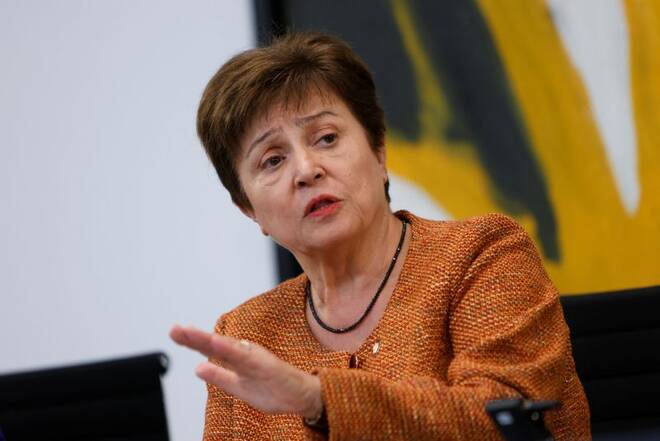Advertisement
Advertisement
IMF’s Georgieva flags inflation, China slowdown as risks to Asia
By:
By Leika Kihara and Tetsushi Kajimoto TOKYO (Reuters) - International Monetary Fund Managing Director Kristalina Georgieva flagged rising inflationary pressures and China's economic slowdown as risks to Asia's economic outlook, calling on policymakers to rebuild their buffers against future shocks.
By Leika Kihara and Tetsushi Kajimoto
TOKYO (Reuters) – International Monetary Fund Managing Director Kristalina Georgieva flagged rising inflationary pressures and China’s economic slowdown as risks to Asia’s economic outlook, calling on policymakers to rebuild their buffers against future shocks.
Asian Development Bank President Masatsugu Asakawa also urged Asia’s policymakers to be vigilant to signs of any abrupt capital outflows driven by steady U.S. interest rate hikes.
“We are already seeing the risk of aggressive tightening of U.S. monetary policy to fight inflation, which may trigger abrupt reversals of capital flows or sharp currency depreciation,” Asakawa said in a video message broadcast at an ASEAN+3 forum held in Singapore on Friday.
Georgieva said economies comprising the Association of Southeast Asian Nations (ASEAN) are a “bright spot” in the global economy, with growth projected at 5% this year and moderating slightly in 2023.
But she warned the outlook was “exceptionally” uncertain and dominated by risks, such as the fallout from Russia’s war in Ukraine, global financial tightening and a slowdown in China’s growth.
“Another pressing global challenge is inflation. It is expected to average only 4% in Asia this year. But inflationary pressures in the region are rising,” Georgieva said.
“We don’t know how long this shock will last and whether other shocks may come. But we need to rebuild and preserve buffers and be prepared to fully use our policy tool-kit,” she told the same forum.
China’s strict COVID lockdowns have weighted on already slowing global growth by dampening domestic economic activity and disrupting supply chains for manufacturers across the world.
The fallout from China’s slowdown has been particularly painful in Asia, where factory activity slumped across the region in November.
Some emerging nations have also been forced to raise interest rates to combat capital outflows caused by U.S. rate hikes, at the cost of hurting their fragile economies.
At the forum, Bank of Japan Governor Haruhiko Kuroda said he did not see a significant risk of Asia facing a sudden loss of confidence or a renewed financial crisis.
But he warned against complacency as some Asian countries saw their policy buffers decrease, after deploying big spending packages to counter the COVID-19 pandemic.
“As the recent market turmoil in the United Kingdom has shown, the reaction of market participants to policy decisions and announcements could signficantly impact asset prices,” said Kuroda, who was formerly head of ADB and Japan’s top currency diplomat.
“ASEAN policymakers must be vigilant” to risks and offer “clear, sufficient and timely communication to avoid unintended outcomes,” he said.
(Reporting by Leika Kihara and Tetsushi Kajimoto; Editing by Shri Navaratnam and Lincoln Feast.)
About the Author
Reuterscontributor
Reuters, the news and media division of Thomson Reuters, is the world’s largest international multimedia news provider reaching more than one billion people every day. Reuters provides trusted business, financial, national, and international news to professionals via Thomson Reuters desktops, the world's media organizations, and directly to consumers at Reuters.com and via Reuters TV. Learn more about Thomson Reuters products:
Advertisement
